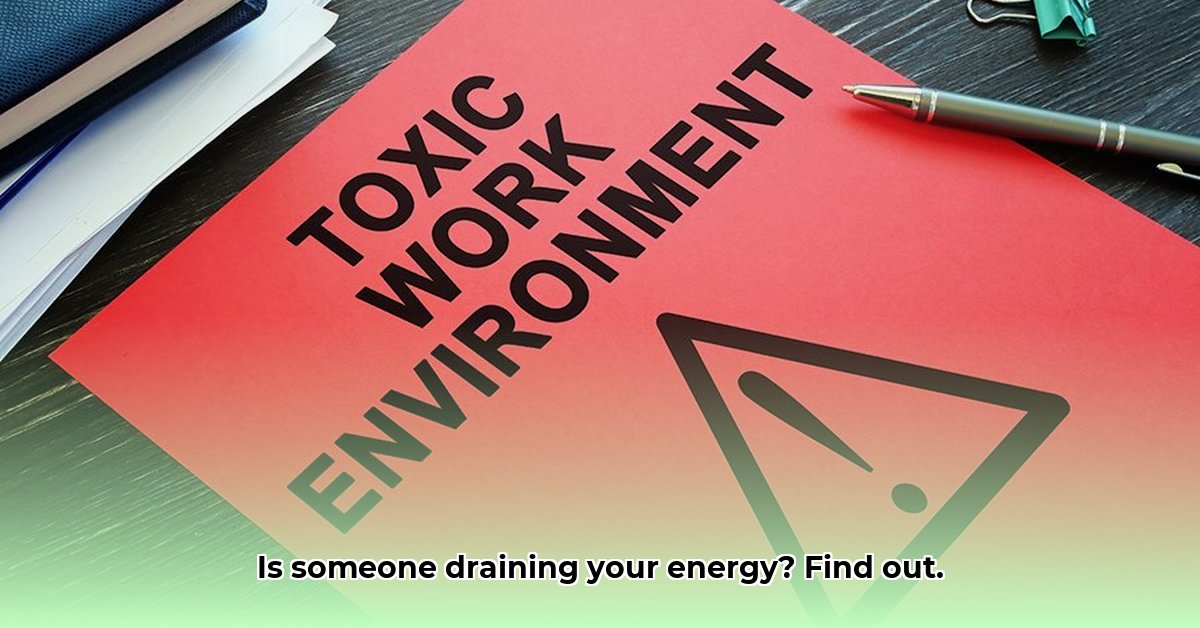
Is your lekker life feeling a bit moerig? Constantly stressed, walking on eggshells, or just plain drained after spending time with certain people? You might be dealing with a toxic person. This isn't about blame; it's about understanding how some behaviours can sap your energy and what you can do to protect yourself. We'll explore what makes someone "toxic," how to spot those sneaky red flags, and – most importantly – how to reclaim your peace. We'll cover setting boundaries, coping strategies, and even when it’s time to distance yourself. Because jou well-being matters.
Identifying Toxic Behaviors: Spotting the Early Warning Signs
Toxic people often exhibit certain behaviours. Think of it as a pattern – once you recognize it, it's easier to spot. Here are some common red flags:
The Constant Complainer: Always finding the negative? Even when things are good? Their negativity can be infectious. It's like a raincloud following them around.
Master Manipulators: Twisting things to make you feel guilty or doubt yourself? This is called gaslighting (making someone question their own sanity). It's like they're rewriting reality.
Boundary-Stompers: Ignoring your limits, even after you've clearly stated them? They push and push, disregarding your feelings. Your needs seem unimportant.
Chronic Liars: Telling little white lies or big whoppers to get their way? Trust is crucial, and they erode it.
Professional Victims: Always portraying themselves as the victim, regardless of the situation? They deflect blame, making you feel responsible for their problems.
The Impact: The Emotional Toll of Toxicity
Dealing with toxicity isn't just uncomfortable; it's damaging. It leaves you feeling confused, unsure of yourself, and exhausted. Your self-esteem takes a hit – it's like a plant slowly wilting. This impacts your happiness and even your physical health. You might experience anxiety, depression, or physical symptoms like headaches or stomach problems. Isn't that swaar?
Setting Boundaries: Protecting Your Energy
Reclaiming your peace starts with setting boundaries – your personal "keep out" signs. Think of it as building a fence around your emotional wellbeing.
Steps to Effective Boundary Setting:
Know Your Limits: What behaviours are unacceptable? Be specific. (Example: "I won't tolerate insults.")
Communicate Clearly: Tell the person what you won't accept. Be firm but polite. Use "I" statements. (Example: "I feel hurt when you...")
Enforce Your Boundaries: If someone crosses a boundary, take action. This could be ending a conversation or limiting contact. (Example: "I'm ending this conversation now.")
Don't Apologise for Your Needs: Your feelings are valid. You have the right to protect yourself.
Coping Mechanisms and Self-Care: Nourishing Yourself
Remember, you're not alone. Self-care is vital. Treat yourself with kindness. You deserve respect and happiness.
Here are some ways to cope:
- Journaling: Writing down your feelings can be therapeutic.
- Exercise: Physical activity releases endorphins, which boost mood.
- Meditation/Mindfulness: These techniques help manage stress.
- Seek Support: Talk to friends, family, or a therapist. Don't hesitate to ask for help – it shows strength.
When to End a Relationship: Prioritizing Your Well-being
Sometimes, despite your efforts, toxic behaviour continues. If your mental and emotional health suffers, consider reducing contact or ending the relationship. Are you constantly anxious? Prioritizing your well-being might mean making a difficult but necessary decision. Remember, healthy relationships lift you up, not drain you.
Conclusion: Your Journey to Peace
You deserve peace and happiness. Learning to identify and manage toxic relationships is a crucial step in building a healthier, happier life. You are worth it. Gaan vir dit!
How to identify and manage toxic family members
Key Takeaways from Ongoing Research:
- Recognizing toxic behaviors is crucial.
- Setting boundaries protects your well-being.
- Self-care is essential for managing stress.
- Sometimes, distance is necessary.
- Support networks and therapeutic intervention are vital.
Spotting the Red Flags: Toxic Family Behaviors
What is a toxic family member? It's not about occasional disagreements—it's consistent negativity, hurtful actions, and a lack of accountability. It's a slow leak draining your energy.
Common signs:
- Control and Manipulation: Trying to dictate your choices, guilt-tripping you, or twisting your words?
- Lack of Empathy: Disregarding your feelings or minimizing your experiences?
- Gaslighting: Making you question your memory or sanity?
- Criticism and Belittling: Constant criticism and put-downs?
- Emotional Abuse: Using insults, threats, or intimidation?
- Unreliable Behavior: Broken promises leaving you confused and let down?
The Toll of Toxic Ties: Impact on Your Well-being
Living with toxic family members takes a toll. The impact can be profound, leading to:
- Low Self-Esteem: Consistent criticism erodes self-worth.
- Anxiety and Depression: Constant stress can manifest as anxiety or depression.
- Physical Health Problems: Chronic stress weakens your immune system.
- Strained Relationships: Negativity spills over into other relationships.
Setting Boundaries: Reclaiming Your Power
Setting healthy boundaries is key. It's not about being unkind, but about protecting yourself.
Step 1: Identify your limits. What behaviors are unacceptable? Step 2: Communicate clearly using "I" statements. (Example: "I feel hurt when...") Step 3: Enforce your boundaries: remain firm. Step 4: Be consistent. Step 5: Accept that they may not change. Focus on your well-being.
Coping Mechanisms and Self-Care: Prioritizing Your Well-being
Self-care is crucial. It's refueling your emotional tank.
- Practice Self-Compassion: Treat yourself with kindness.
- Exercise: Physical activity releases endorphins.
- Mindfulness and Meditation: Manage stress and improve emotional regulation.
- Journaling: Process your emotions.
- Seek Support: Talk to a trusted friend, family member, or therapist.
When to Step Back: Protecting Your Mental Health
Sometimes, limiting or ending contact is the healthiest choice. It's self-preservation. If the toxicity is overwhelming, professional guidance is essential.